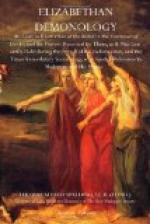60. Another power possessed by the evil spirits, and one that excited much attention and created an immense amount of strife during Elizabethan times, was that of entering into the bodies of human beings, or otherwise influencing them so as utterly to deprive them of all self-control, and render them mere automata under the command of the fiends. This was known as possession, or obsession. It was another of the mediaeval beliefs against which the reformers steadily set their faces; and all the resources of their casuistry were exhausted to expose its absurdity. But their position in this respect was an extremely delicate one. On one side of them zealous Catholics were exorcising devils, who shrieked out their testimony to the eternal truth of the Holy Catholic Church; whilst at the same time, on the other side, the zealous Puritans of the extremer sort were casting out fiends, who bore equally fervent testimony to the superior efficacy and purity of the Protestant faith. The tendency of the more moderate members of the party, therefore was towards a compromise similar to that arrived at upon the question how the devils came by the forms in which they appeared upon the earth. They could not admit that devils could actually enter into and possess the body of a man in those latter days, although during the earlier history of the Church such things had been permitted by Divine Providence for some inscrutable but doubtless satisfactory reason:—that was Catholicism. On the other hand, they could not for an instant tolerate or even sanction the doctrine that devils had no power whatever over humanity:—that was Atheism. But it was quite possible that evil spirits, without actually entering into the body of a man, might so infest, worry, and torment him, as to produce all the symptoms indicative of possession. The doctrine of obsession replaced that of possession; and, once adopted, was supported by a string of those quaint, conceited arguments so peculiar to the time.[1]
[Footnote 1: Dialogicall Discourses, by Deacon and Walker, 3rd Dialogue.]
61. But, as in all other cases, the refinements of the theologians had little or no effect upon the world outside their controversies. To the ordinary mind, if a man’s eyes goggled, body swelled, and mouth foamed, and it was admitted that these were the work of a devil, the question whether the evil-doer were actually housed within the sufferer, or only hovered in his immediate neighbourhood, seemed a question of such minor importance as to be hardly worth discussing—a conclusion that the lay mind is apt to come to upon other questions that appear portentous to the divines—and the theory of possession, having the advantage in time over that of obsession, was hard to dislodge.




